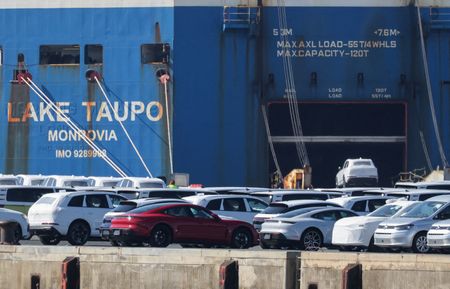MANILA (Reuters) -Japanese Prime Minister Shigeru Ishiba held talks on Tuesday with President Ferdinand Marcos Jr, in a move to advance security and economic ties between two of Washington’s closest Asian allies amid rising Indo-Pacific tensions.
Ishiba’s visit to the Philippines comes at a crucial time, with both countries confronting growing concerns over regional security and China’s assertiveness in the South China Sea, while navigating global trade tensions sparked by sweeping U.S. tariffs and increased friction between the United States and China.
Ishiba said he discussed with Marcos the far-reaching impact of U.S.-China trade tensions on the global economy and multilateral free trade frameworks. He assured Marcos he would heed the concerns of Japanese companies operating in the Philippines to find solutions.
The two leaders also explored ways to further defence and economic ties, with talks centred on Japan’s official security assistance programme, of which the Philippines was among the first beneficiaries.
Ishibal said Japan and the Philippines had started talks on a potential information security agreement, which would enable exchanges of confidential information and boost security cooperation.
Last year, Japan and the Philippines signed the Reciprocal Access Agreement, the first of its kind Japan has signed in Asia, that would allow deployment of forces on each other’s soil.
While the Philippines has ratified the pact, it still awaits legislative approval in Japan. Once in place, it will ease the entry of equipment and troops for combat training and disaster response and smooth cooperation between their militaries.
COUNTERING CHINA
Ishiba and Marcos also commitment to promoting a free and open Indo-Pacific and upholding a rules-based international order.
“I hope that our two nations will continue to closely communicate with each other to oppose attempts to change the status quo in the East and South China Seas by force or coercion,” Ishiba said at a joint press conference with Marcos.
Both the Philippines and Japan have taken a strong line against what they see as an increasingly assertive Beijing in the South China Sea and concern over tension across the Taiwan Strait.
Japan, which announced in 2023 its biggest military build-up since World War Two in a step away from post-war pacifism, does not have any claims to the busy waterway. But it has a separate maritime dispute with China in the East China Sea, where the neighbours have repeatedly faced off.
Ishiba’s visit to Manila also coincides with Japan’s participation in ongoing military exercises alongside Philippine and U.S. forces.
“We affirmed on the importance of the Japan, Philippines and the United States trilateral cooperation,” Ishiba said.
(Reporting by Karen Lema; Editing by Martin Petty)











